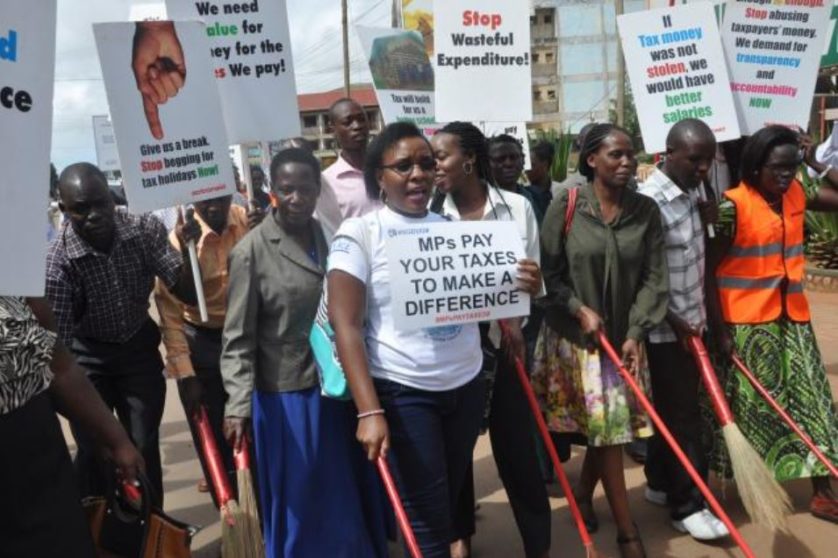There is growing international attention on tax collection in low-income countries. This attention is only amplifying in light of the increased revenue pressures faced by governments around the world as a result of the Covid-19 pandemic. While governments will be seeking new revenue sources in the coming years, increased revenue is only desirable in so far as it supports fairer and more equitable outcomes, which are affected both by how revenue is collected and how it is spent. The promised benefits of investing in tax systems are likely to depend on the ability of taxpayers to generate pressure for fair and equitable taxation and the consistent translation of tax revenues into public benefits. This raises new concerns in light of the major inequities that are resulting from and being reinforced by the pandemic and policy responses.
This reality implies that greater attention should be paid to the role that civil society—including NGOs; community, business, trade, and professional associations; traditional authorities; and the media—can play in shaping tax reform agendas at the local, national, and international levels. Civil society can play an influential role in helping to achieve more equitable taxation by advocating for fairer tax systems and strengthening the ability of taxpayers to hold governments to account. Despite this potential, we do not know very much about how civil society can actually help to achieve more equitable and accountable tax systems in practice. Given growing inequities as a result of the current crisis, understanding the potential role of civil society in ensuring more equitable tax policies—and how to support this—is now more important than ever.
Advocating for more equitable tax systems
Civil society can contribute to more equitable tax systems by playing an advocacy role. Effective advocacy may point to key areas of policy and administration reform, including supporting more effective taxation of the wealthy, reducing heavy burdens on the poor, and increasing fairness in administration. While these initiatives should have constituencies for advocacy, in practice advocacy and reform have proven consistently challenging for two key reasons:
- There has been consistent difficulty in mobilising broad popular support—and thus political power—in support of improved taxation, as distinct from more common anti-tax advocacy.
- Bottom-up national campaigns around revenue-raising have been relatively scarce, while local, national, and international advocacy agendas have often lacked cohesion.
These challenges point to the need for advocacy strategies that can build positive political power to overcome entrenched resistance. Doing so is likely to mean engaging broader constituencies in tax debates by making them more relevant and accessible beyond traditional circles, while building trust in tax systems so as to shift from anti-tax advocacy toward advocacy for better taxation. At the same time, advocacy strategies may be more effective if they are driven by and responsive to local priorities. While campaigns in different contexts may have different priorities, the hope is that broader advocacy campaigns can retain coherence by focusing on the overarching goals of fairness and equity. Recent experience points to several potentially useful strategies, including strengthening the links between locally-owned research and advocacy and between taxation and expenditure.
Supporting taxpayer engagement
Civil society may further contribute to more equitable taxation by strengthening the ability of taxpayers to hold governments to account. To do so, it may encourage popular mobilisation around tax issues to improve the ways that revenues are used and may serve as a platform to support broader demands for accountability. Evidence suggests that in some contexts the expansion of taxation has helped to empower taxpayers to demand greater responsiveness and accountability from governments, with new taxation both mobilising and empowering taxpayers. It is equally clear, however, that such positive tax bargaining is far from guaranteed: it depends, most fundamentally, on taxpayers being able to mobilise and wield the power necessary to make effective demands on governments. In many low-income countries, however, taxpayer engagement has been limited, largely due to three issues:
- Tax expertise among civil society actors has been relatively limited, with public engagement on tax issues often left to a relatively small group of experts.
- Citizens in general have limited “tax literacy”—that is, the understanding and awareness of how governments raise revenues and how that links to public spending. Most citizens do not know what taxes they need to pay or how tax revenues are spent. This can be particularly problematic given frequently negative taxpayer perceptions of the fairness of tax systems and can be exacerbated in settings where public service provision is poor and tax resistance is already widespread.
- In some contexts, taxpayers report a hesitancy or fear of getting more engaged in advocacy, for fear of the economic, political, or social repercussions of doing so.
Given these challenges, increasing tax literacy and the transparency of tax systems is thus particularly important. Governments across sub-Saharan Africa have adopted a wide range of initiatives to promote tax literacy, including national taxpayer days, tax education in schools, radio and TV programmes, and social media campaigns. There has been, however, almost no evaluation of the impact and outcome of these initiatives. Moreover, recent research shows that efforts to improve tax transparency and tax literacy are often limited in practice, with information often remaining inaccessible and insufficiently meaningful to the majority of taxpayers. More fundamentally, even with improved tax literacy, the impact of greater knowledge may be limited without strengthened taxpayer mobilisation and engagement. Accordingly, civil society can play an effective role in improving taxpayer engagement by acting in three key ways:
- As a translator, to make tax information and data more accessible and meaningful to taxpayers. This includes ensuring that information is shared in a manner and through channels that are easily accessible to average taxpayers, while being adapted to local contexts and aligned with local priorities.
- As a trainer, by sharing tax knowledge and giving taxpayers and/or community leaders the skills necessary to make sense of tax revenues and public expenditures.
- As an enabler of taxpayer engagement, encouraging taxpayers to make demands of government. For instance, civil society actors may support safe, secure, and sincerely open spaces for dialogue between taxpayers and government officials or may help taxpayers develop collective demands and engage more constructively in public forums.
Overall, civil society strategies may be most effective if they combine different channels of influence; for instance, educating citizens about tax issues, while also helping to mobilise social actors to keep government accountable and responsive. Without this link, there is the risk that increased taxpayer education and transparency is not actually translated into meaningful action or greater equity and accountability.
Civil society and taxation: A research agenda
The ICTD research programme on tax and civil society aims to better understand how civil society may support equitable taxation and strengthen taxpayer engagement, particularly in light of the challenges of political resistance to reform and limited coordination among different actors and priorities. We are currently seeking to support innovative research on these issues and are accepting research proposals. Please see our call for proposals here.



